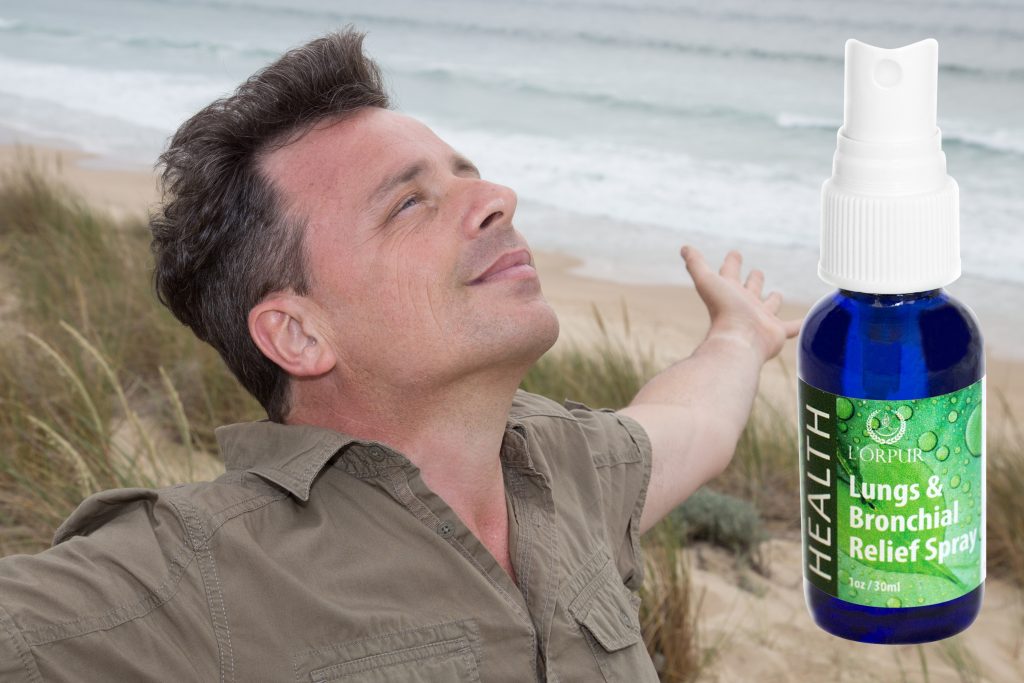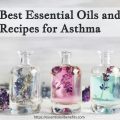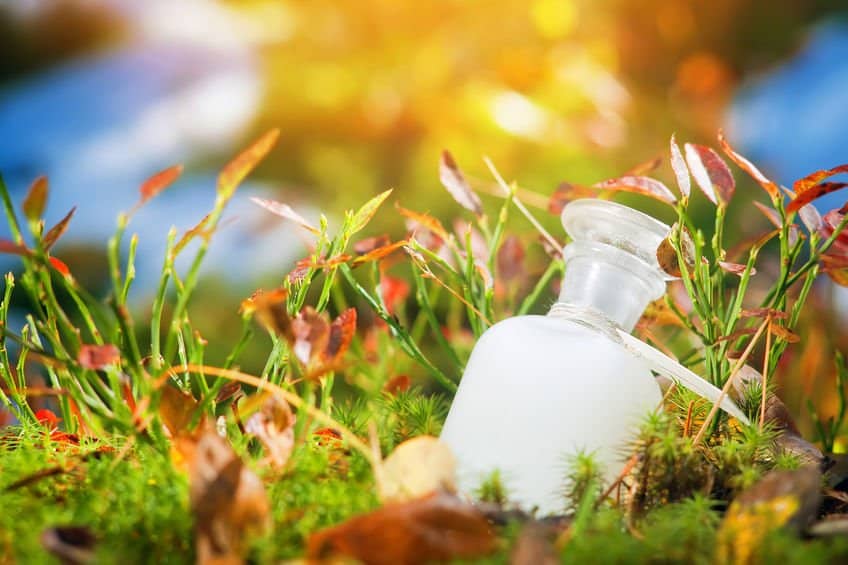
Did you know that pneumonia affects 7 % of earth’s entire population? That’s over 450 million people on a global scale.
Back in the 19th century, pneumonia was regarded to as the captain of the men of death due to the unbelievably high death tolls recorded. But as vaccines and antibiotics improved over the centuries, survival rates keep getting better.
Today, however, pneumonia still claims over 4 million people every year. In this segment, we’ll be looking at what exactly pneumonia is and how it presents itself. We’ll also look at some of the leading causes of pneumonia as well as how to prevent, treat, remedy and manage the condition.
What Is Pneumonia?
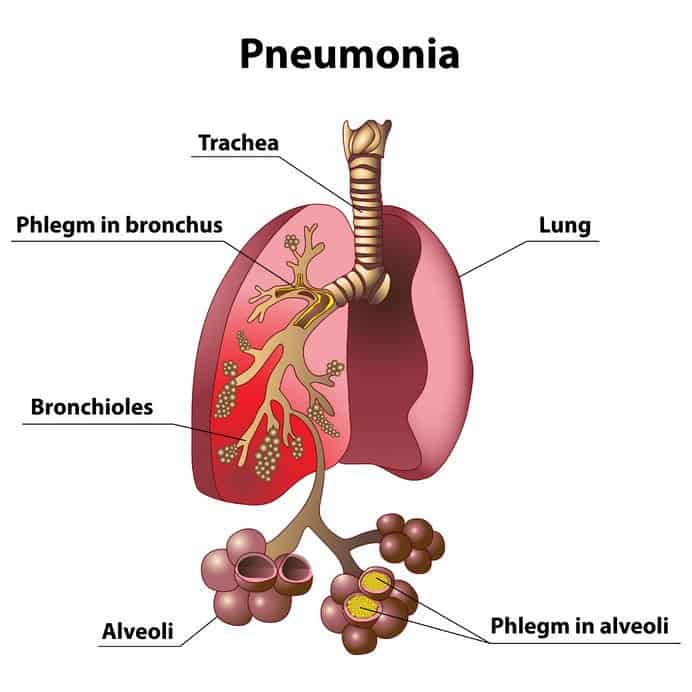
Pneumonia is a lower respiratory lung infection that causes inflammation in either one or both of the lungs. The condition primarily affects the alveoli air sacs which then fill up with pus or fluids causing flu-like symptoms.
Normally, pneumonia tends to clear in about 2 to 3 weeks, but some risk factors can escalate the illness and make it life-threatening. In the US alone, over 1 million people are treated for pneumonia each year. Sadly, 50,000 of them don’t make it. But how exactly do you know that you have pneumonia?
Signs And Symptoms Of Pneumonia
Typically, the symptoms of pneumonia include some combinations of dry or productive coughs, fever or chills, chest pains, phlegm, difficulties breathing, among others. That’s why most people tend to misdiagnose it initially for a cold or flu. I’ve compiled some of the most common and widespread symptoms of pneumonia below.
- Dry and/or productive coughs
- Shortness of breath
- Fevers and shaky chills
- Green, rusty phlegm or sputum coughed from the lungs
- Increased heartbeat
- Chest pains known as pleuritic pain
- Headaches and muscle pains
- Nausea and vomiting
- Dark or purplish skin color
- Delirium and confusion in older adults
What Causes Pneumonia?
Contrary to popular belief that pneumonia is caused by the cold, parasites or fungi, it’s actually brought about by infections from viruses and bacteria. Now, here’s what makes pneumonia so dangerous; it is one of the most easily contagious diseases on the planet. All it takes is a few pneumonia-causing germs to settle on the alveoli and begin multiplying.
You can get pneumonia going about your daily activities; you can get it from a nursing home or even hospital. Aside from being breathed in through coughing and sneezing, pneumonia-causing bacteria can also be passed on via direct contact or by sharing objects through touch. Before we look at the different factors that could put you at risk of pneumonia, let’s delve a bit deeper into the leading causes.
Bacteria
This is the most common cause of community-acquired pneumonia with the bacteria Streptococcus pneumonia responsible for over 50% of all pneumonia cases. Other commonly isolated bacteria include Haemophilus influenzae present in 20% as well as Chlamydophila pneumoniae in 13%. A number of drug-resistant versions of the above infections are becoming more common, including drug-resistant Streptococcus pneumonia.
Viruses
When it comes to adults, about a third of pneumonia cases are caused by viruses while children only report 15%. Some of the most common pneumonia-causing viruses include coronaviruses, rhinoviruses, respiratory syncytial virus, adenovirus, influenza virus, and Herpes simplex virus.
Fungi
While uncommon, there are increasing cases of fungal pneumonia that occur in people with weakened immune systems due to immunosuppressive drugs, AIDS, and other medical conditions. The most common fungi include Histoplasma capsulatum, Cryptococcus neoformans, Blastomyces, Pneumocystis jiroveci and Coccidioides immitis.
Parasites
While also no too common, a variety of different parasites can cause pneumonia by affecting the lungs. These include Strongyloides stercoralis, Plasmodium malariae, Ascaris lumbricoides, and Toxoplasma gondii.
Other Risk Factors For Pneumonia Include:
- Smoking tobacco and/or consuming larger amounts of alcohol
- Having a weaken immune system
- Underlying health conditions such as asthma, COPD, cystic fibrosis among others
- Malnutrition or hospitalization
- Exposure to pollutants and certain chemicals
- Being under age 5 of over 65 years old
Prevention, Treatment And Management Of Pneumonia
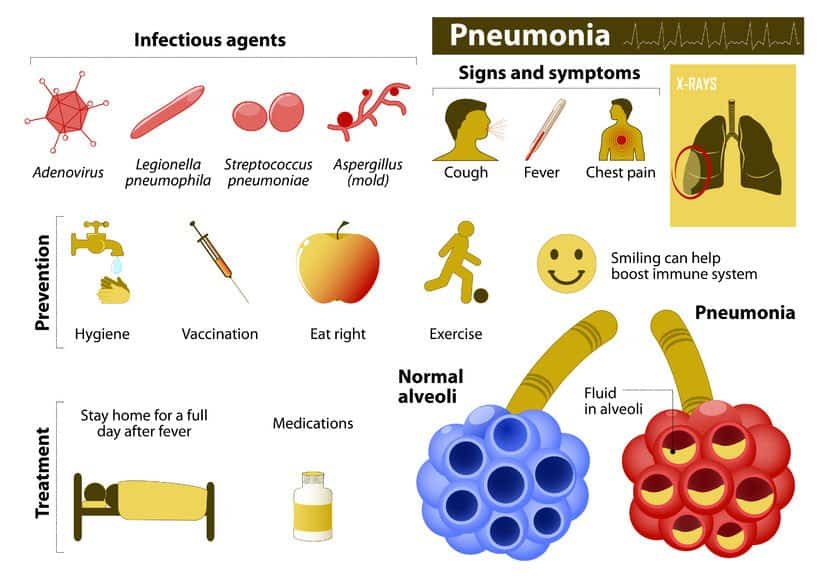
1. Prevention
If there’s one thing that has helped curb the spread and deaths caused by pneumonia, it would have to be the preventative measures. If the appropriate measures were taken globally, it is believed that mortality rates in children could be reduced by as much as 400,000. How? By following these simple preventative measures.
a) Vaccination – According to the Centre for Disease Control and Prevention, immunizations significantly decrease the risk of viral and bacterial pneumonia in both children and adults. Vaccinating against influenza, Haemophilus influenzae and Streptococcus pneumoniae have already shown good evidence to support the prevention of pneumonia. Other vaccines for which there is support for a protective effect against pneumonia include pertussis, varicella, and measles.
b) Medications – Whenever influenza outbreaks occur, meds such as rimantadine could help prevent the condition. However, there are plenty of side effects associated with some of these medications.
c) Other Preventative Measures
In addition to treating and addressing all the underlying illnesses that could cause pneumonia such as AIDS, diabetes, and malnutrition, lifestyle changes could also make a huge difference. Smoking has been identified as the single biggest risk factor for pneumonia in otherwise healthy adults. As such, smoking cessation and reducing instances of indoor pollution could really help prevent cases of pneumonia.
2. Treatment
The good news is that most cases of pneumonia are treatable and only take a few weeks for the person to recover completely. However, that will depend on the severity of the pneumonia and whether or not you do anything about the underlying cause. Doctors all over the world prescribe a mixture of simple analgesics, oral antibiotics, rest, and fluid replenishment as the ideal treatment for pneumonia. However, there are plenty of natural solutions and home remedies that can help offer relief. But first, let’s see what western medicine has to offer.
Antibiotics
When it comes to bacterial pneumonia, nothing beats good old antibiotics. However, the choice of antibiotics depends on the person’s age, underlying health factors and even location of infection. The first medical line of defense for community-acquired pneumonia is usually amoxicillin and azithromycin, with clarithromycin or doxycycline as alternatives. But as expected, the side effects that come with antibiotics can be wide-ranging.
Pain Killers
In some cases of pneumonia, the chest pains, headaches and fever might be too much to bear. In this case, your doctor will prescribe some OTC painkillers to relieve the pain and discomfort including Ibuprofen, Aspirin, Motrin, Advil, Tylenol, and Acetaminophen.
Oxygen Therapy
When the fluid in the air sacs become too much and your lungs get too inflamed, then the intake of oxygen is substantially reduced. To keep all other body functions working optimally, you have to substitute the body’s own oxygen intake. Doctors will recommend the O2 therapy once your lungs are unable to conduct proper gaseous exchange.
Pneumonia And Essential Oils
By now, you’ve probably heard all about the numerous benefits of essential oils for treating a myriad of ailments. When it comes to the management of respiratory conditions, nothing beats the organic goodness and efficacy of Mother Nature’s very own healing ointment. Extracted from the leaves, roots, flowers, barks, and seeds of different plants, these highly concentrated essential oils hold immense potent healing effects.
When it comes to pneumonia, there’s more than enough research to prove the benefits of going for natural treatments. Most EOs contain specific notable properties that not only help in treating and managing pneumonia, but also preventing it in the first place. These include anti-bacterial, antifungal, antiviral and antimicrobial properties that all help to fight and kill pneumonia causing bacteria.
Similarly, essential oils contain potent anti-inflammatory properties and compounds that significantly reduce inflammation within the lungs and air sacs. Another notable compound in some essential oils is analgesic which helps relieve frequent coughs and chest pains safely.
And last but not least, some volatile oils contain decongestants which help break down the thick phlegm and drain mucus associated with pneumonia. Out of over 74 different essential oils, I’ve isolated a few that showed the most robust effects against pneumonia-causing bacteria. I’ve also included some age-old recipes that should help you put these oils to good use.
6 Best Essential Oil Recipes For Pneumonia
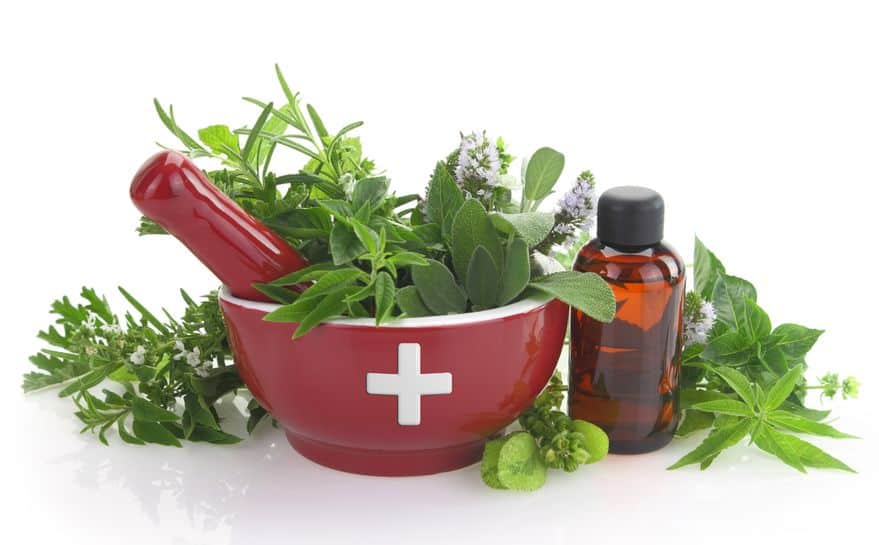
Recipe 1: Decongesting EO Chest Rub
What you need:
- 7 drops Peppermint essential oil
- 5 drops Lavender essential oil
- 4 drops Camphor essential oil
- Quarter cup Shea Butter
- Tablespoon of Beeswax pastiles
- Non reactive container
Method:
When it comes to drawing out phlegm and mucus lodged way deep within the lungs, nothing works better than this EO decongesting chest rub. For this rub, I included incredibly potent decongestants and menthol rich oil that can provide a calming and soothing pain relief. While the lavender contains strong analgesic compounds that help with falling asleep at night, the peppermint offers a cooling and relieving sensation that helps clear congestion in the airways.
To make use of this recipe, start by melting the shea butter and beeswax. Once fully melted, remove the shea-wax mixture from the heat and let it cool a bit. Add in your essential oil right before it solidifies and give the entire mixture a good stir. Transfer your recipe into a nonreactive container and place it in the fridge to cool and set. Rub the cool blend over your chest every night until the pneumonia clears.
Recipe 2: EO Pneumonia Steam Blend
What you need:
- 5 drops Tea Tree essential oil
- 4 drops Eucalyptus essential oil
- Thick towel
- Large bowl
- Hot water
Method:
If you’re dealing with large volumes of phlegm and mucus in the lungs, steam inhalation can help solve the problem at the root. The steam dislodges and clears the mucus all through the airway and allows it to come out much easier. And once you mix the steam with some EOs, they get right into the respiratory system and help fight off infection.
To make use of this recipe, start by bringing some water to a boil and then transferring it to a large bowl. Add in your essential oils drop by drop and give the water a good stir to mix the ingredients. While seated comfortably on a chair, hang your head over the bowl of hot water in a way that the steam hits your face but doesn’t burn it. Place the thick towel over your head to trap all the vapor and breathe in the vapor in intervals of five minutes. Repeat this three times a day and make sure you have a handkerchief nearby to blow the mucus as it dislodges.
Recipe 3: EO Reflexology Foot Rub for Pneumonia
What you need:
- 8 drops Rosewood essential oil
- 5 drops Thyme essential oil
- 3 drops Lavender essential oil
- 30ml (1 ounce) Fractionated coconut oil
- Dark colored glass bottle
Method:
Incorporating volatile oils into a foot reflexology massage is hands down one of the best ways to administer EOs for pneumonia. This especially applies to small kids and children. Foot reflexology refers to the stimulation and massage of particular areas on the foot that are believed to correspond to various organs in the body. The lung reflexology point is on the upper ball of the foot between the big toe and the pinky toe.
Mix all your essential oils together in the glass jar and top off with the fractionated coconut oil. Shake the glass bottle to get everything mixed. Rub the foot blend at the under soles of your feet while gently massaging in a circular motion for about 5 minutes. Do this every night before bed and once when you wake up to reap all day and night benefits of the essential oils. While the essential oils are easily absorbed by your feet, you might want to wear some socks to prevent the oils from staining your sheets.
Recipe 4: Oregano Capsules for Pneumonia
What you need:
- 1 drop 100% pure food grade Oregano EO
- Olive oil
- Vegetable capsules, size 00
- Dropper
Method:
Although the ingestion of essential oils is rarely required, some EOs need to be ingested to work internally. Oregano is one of these oils and can be taken to help fight bacterial infection and inflammation from within the lungs. Using your dropper, fill an empty vegetable capsule with a drop of pure food grade Oregano essential oil and top up with olive oil. Take this potent antibacterial tablet once a day to get relief from pneumonia.
Recipe 5: Lemongrass Gargle Shots for Pneumonia Congestion
What you need:
- 2 drops Lemongrass Essential Oil
- 1 drop Oregano EO
- 1 drop Peppermint EO
- Regular shot glass
- Half a teaspoon of coconut oil
- Warm Water
Method:
As you can see, this recipe is made of plants you can find around the kitchen. However, the essential oils help achieve results much faster than just using organic matter. Here, you’ll need 2 drops each of the above essential oils, some warm water, a shot glass, your choice of carrier oil and some killer gargling skills.
Mix your essential oils in the glass and pour in the hot water. Add in the carrier oil and stir gently to get everything mixed up. Next, gargle the blend for about half a minute making sure it hits all parts of your throat and mouth. DON’T swallow, make sure you spit the mixture and wait a while before rinsing.
The oregano and peppermint EOs contain incredibly potent expectorant, antispasmodic, anti-inflammatory and relaxing properties that all combine perfectly to create the perfect decongestant. So while these vapors get to the lungs to break up phlegm and mucus buildups, the lemongrass essential oil’s antiseptic and antimicrobial effects will ensure things stay that way. Take your LemoGano Mint shot twice a day or when you feel an unbearable bout of congestion coming in.
Recipe 6: Ginger EO Inhaler Pneumonia Stinger
What you need:
- 4 drops Ginger essential oil
- 2 drops Eucalyptus essential oil
- Several Handkerchiefs
Method:
If there’s anything to be said about ginger, it would probably start with amazing decongestant and detoxifier. Ginger essential oil is jam-packed with anti-inflammatory, antiseptic, antioxidant, antibacterial, and analgesic properties that all work well to treat pneumonia.
But that’s not all; the incredibly potent expectorant components make ginger and eucalyptus quite the useful tools in lubricating the airways and making breathing easier. If you’ve ever had a whiff of camphor, you know what I’m talking about.
To make use of this stinger, simply take out a clean kerchief and add a few drops of ginger and eucalyptus essential oil. Crease it up a bit to get the oils loose and then cup the handkerchief in your hands and inhale for as long as you want. Once you feel your airways clearing up and the phlegm breaking apart, you can use another handkerchief to blow your nose or just spit up a massive, noisy loogey on the ground (trust me, it always feels much better to get it off your chest).
4 Home Remedies For Pneumonia
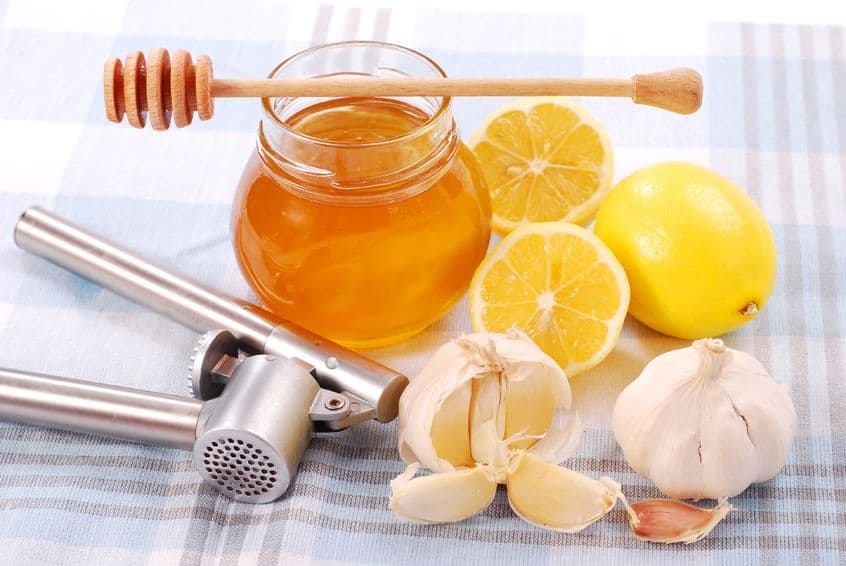
When it comes to pneumonia, most of the home remedies that can offer relief for the condition are quite similar to flu, cold and cough remedies. I’ve sampled some of the most popular and potent remedies for pneumonia. They include:
1. Garlic Tea
In addition to being a rich source of antibiotics and anti-bacterial compounds, garlic has been proven to give a much-needed boost to your immune system. Likewise, garlic cloves help bring down the body temperature and break down stubborn phlegm out of your lungs and chest cavity.
Now, I know that it’s really tough to do raw garlic, but some people actually recommend chewing a few roasted cloves all through the day to benefit from the expectorant and immune boosting properties. For pneumonia patients, mix a cup of milk in a bit of water and add in a teaspoon of crushed garlic. Bring the solution to a boil and drink it about three times a day.
2. Cayenne Pepper
While also a standard, hot seasoning for almost all means, cayenne pepper can also be a handy ally in the fight against pneumonia. Research has actually shown that the pepper has incredibly high levels of capsaicin which is a potent expectorant. It stimulates the release of mucus from your airways and also helps in the development of healthy mucous membranes which are usually abused by pneumonia and inflammation.
3. Saltwater Gargle
When it comes to treating the human body, there’s very little that good old salt can’t do. For pneumonia-related congestion and respiratory issues, there are plenty of ways you can use salt. If you’re feeling a bit clogged up with phlegm, gargling with warm saltwater works wonders.
Not only does in help break down and get rid of excessive mucus production in the airways, but it also helps relieve inflammation and irritation in the lungs, chest, and throat. Simply dissolve half a teaspoon of salt into a glass of warm water and gargle the mixture for about 30 seconds before spitting it out. Repeat this three times a day.
4. Vegetable Juice
Mother Nature usually has all the treatment and remedy you need for most ailments. So, what does the perfect veggie juice for pneumonia look like? Well, you’ll need to start by running some carrots, beetroots, and cucumbers in the juicer every day. Similarly, you’ll need the detoxing juices of spinach and kale which are excellent for your health. In the case of pneumonia, vegetable juices are rich in chloride, iron, phosphorous, and other properties that are incredibly beneficial for your lungs. What’s more, they also help replenish lost fluids and give your immune system a much-needed boost for the final push to recovery.
Recommended Product
Want to ease the symptoms of pneumonia and/or seasonal threats and breathe easier. Look no further! The L’orpur Lungs & Bronchial Relief Spray is a powerful combination of Organic Plant Acids (OPA) and wild-crafted herbs that opens up your airways and help provide respiratory support. Click here to find out more…
The Final Word
There you have it folks, everything you need to know about pneumonia is now at the tip of your fingers. With this information, identifying the early signs of pneumonia and preventing it should be much easier now. And if your case has progressed, don’t be scared; there’s literally no shortage of treatments and management techniques for pneumonia.
Typically, your pneumonia should start to improve as soon as you start your selected route of treatment. But at the same time, try to remember that pneumonia is quite serious and may take months for you to completely recover. So please, pace yourself, give your body enough time to heal, take in plenty of fluids and make sure you get more than enough rest. Trust me, you’ll be feeling better and back on your feet ready to take on the world in no time.


